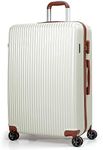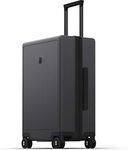Buying Guide for the Best Hard Luggage
When choosing hard luggage, it's important to consider factors that will ensure your travel experience is as smooth and stress-free as possible. Hard luggage is known for its durability and protection, making it a great choice for those who travel frequently or carry fragile items. To find the best hard luggage for your needs, you'll want to look at several key specifications that can impact your travel experience. Understanding these specifications will help you make an informed decision and choose luggage that fits your travel style and requirements.MaterialThe material of hard luggage is crucial as it determines the durability and weight of the suitcase. Common materials include polycarbonate, ABS, and aluminum. Polycarbonate is lightweight and flexible, making it resistant to cracks. ABS is more affordable but less durable than polycarbonate. Aluminum is the most durable but also the heaviest. If you prioritize lightweight and flexibility, polycarbonate is a good choice. For budget-friendly options, ABS might be suitable, while aluminum is ideal for those who need maximum protection and don't mind the extra weight.
SizeSize is an important factor as it affects how much you can pack and whether the luggage meets airline requirements. Luggage typically comes in carry-on, medium, and large sizes. Carry-on sizes are great for short trips and avoiding checked baggage fees, while medium and large sizes are better for longer trips or if you need to pack more items. Consider your typical travel duration and packing habits when choosing the size. Ensure the dimensions comply with your preferred airline's regulations to avoid extra fees.
WeightThe weight of the luggage itself can impact your travel, especially with airline weight restrictions. Lighter luggage allows you to pack more without exceeding weight limits. Hard luggage can vary in weight depending on the material and size. If you often travel by air and need to maximize your packing capacity, opt for lighter materials like polycarbonate. For road trips or if weight is not a concern, heavier materials like aluminum can offer more protection.
WheelsWheels are essential for maneuverability. Hard luggage typically comes with either two or four wheels. Two-wheel designs are more stable on uneven surfaces, while four-wheel (spinner) designs offer 360-degree movement, making them easier to navigate in airports. If you frequently travel through airports or smooth surfaces, four-wheel luggage can be more convenient. For rougher terrains, two-wheel luggage might be more suitable.
Locking MechanismA good locking mechanism is important for security. Many hard luggage options come with built-in locks, often TSA-approved, which allow security personnel to open your luggage without damaging it. If security is a priority, look for luggage with a reliable locking system. TSA-approved locks are particularly useful for international travel, as they comply with security regulations in many countries.
Compartments and OrganizationThe internal organization of your luggage can greatly affect how you pack and access your belongings. Some hard luggage offers multiple compartments, dividers, and pockets to help keep your items organized. If you prefer to keep your belongings separated and organized, look for luggage with more compartments and dividers. For those who pack light or don't mind a more open space, simpler designs might suffice.















